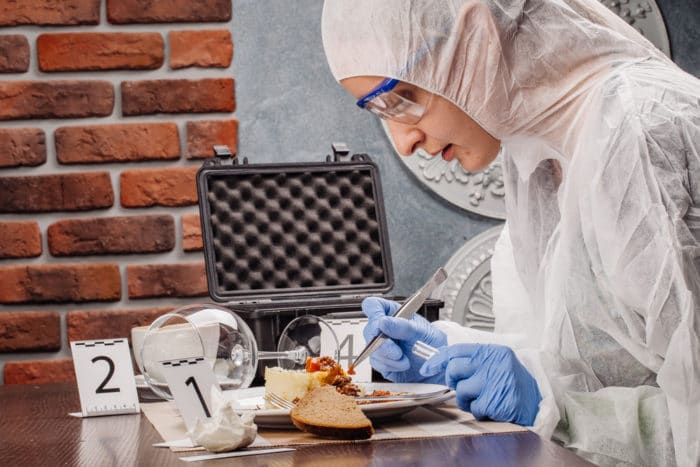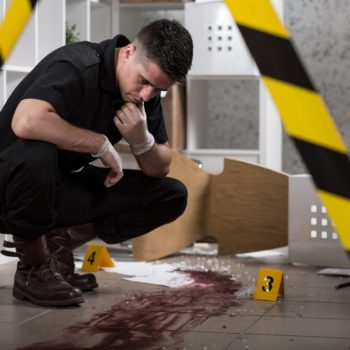Why We Love It
-
$79,620Potential Avg. Salary
-
-1.2%Job Growth Rate
-
Growing IndustryCareer Attribute
-
InvestigativeCareer Attribute
Crime scene investigators collect forensic evidence along with law enforcement officials at crime scenes. They determine what evidence needs to be collected by evaluating the crime scene, use a variety of tools and techniques to collect and document evidence, and transport evidence to labs for analysis.
Recommended Schools
What is a Crime Scene Investigator?
The following job responsibilities are common for individuals in crime scene investigator roles:
- Visit crime scenes and evaluate the types of evidence that needs to be collected
- Investigate crime scenes to uncover evidence that perpetrators unintentionally left behind
- Collect evidence using a variety of techniques, including taking photographs, collecting fingerprints and DNA, mapping blood spatters, and collecting materials for further analysis
- Transport materials safely to labs
- Conduct laboratory tests to transform collected materials into evidence
A Day in the Life
Crime scene investigators arrive at the scene of crimes shortly after a crime scene is discovered. They use their skills and talents to collect evidence that can be used to determine what happened during a crime: what weapon was used, who the perpetrator was, and how the event unfolded. They do this by evaluating a crime scene for evidence, looking for fingerprints, DNA, weapons, footprints, and materials that seem to be out of place, such as soil from a different land type than the location of the crime.
Beyond collecting evidence, crime scene investigators also document crime scenes. They take photographs and create mappings of evidence like blood spatters. All of this evidence is thoroughly documented and taken back to laboratories where it can be evaluated to begin creating the story of a crime. In the lab, the crime scene investigator runs fingerprints and DNA samples to identify who was present when a crime occurred, and may work with special forensic scientists to test unusual evidence to determine if it bears any significance to the crime or perpetrator.
With collected evidence and laboratory findings, crime scene investigators are able to use collected evidence to support detectives in identifying perpetrators and building a case against them. The crime scene investigator reports his/her findings to the detective in charge of the case and finds evidence that supports or disproves different theories on what occurred and who participated. The crime scene investigator may also be required to participate in court trials to explain the methods used to collect evidence and form theories.
Typical Work Schedule
Crime scene investigators work starts as soon as a crime is reported and that means working during the day, evening, night shifts and may have to work overtime. They normally follow a standard 40 hours per week schedule, but they rotate in different shifts so that investigators are available around the clock. They also have to be available on call and ready outside of normal business hours as needed to collect or analyze evidences. This means that the working schedule will often extend beyond the regular working hours for most crime scene investigators. Additionally, they do not get all the vacations or holidays commonly available for other jobs. They also may be required to travel throughout their jurisdictions, which may be cities, counties, or states if their expertise was need anywhere else.
Projected Job Growth
According to the US Bureau of Labor Statistics, the demand for crime scene investigators and forensic scientists is expected to increase by 14 % from 2019 to 2029 which is much faster than the average for all the other jobs. However, this percentage represents only 2,400 vacancies as the total number of hired crime scene investigators is limited in the country. Adding professional certificate like Forensic Crime Scene Investigators Certification (FCSIC) as well as expertise in different fields should give you an edge in this competitive job market. The growth of the demand for the job is owed to the fact that state and local governments hire additional crime scene investigators and forensic scientists to be able to manage the higher rates of cases. In addition, recent scientific and technological advances lead to the increased availability, reliability, and usefulness of objective forensic information used as evidence in trials which is a considerable part of the job.
Typical Employers
The typical employer for this job is the government along with the police force and other law enforcement agencies. This means working for the local government which is the most common case. You may also work for the state government or the federal government which is usually more rewarding. There is also an option to work as a private investigator but you should take into consideration the laws regulating this job.
Recommended Schools
How To Become a Crime Scene Investigator
For the most part, crime scene investigators are both scientists and trained police officers. Most begin their education by pursuing a bachelor’s degree in a field of natural sciences, such as chemistry, biology, or forensics. These degrees each teach aspiring crime scene investigators about the basic physiological components that will become important in their careers when they begin working as crime scene investigators.
The reason for starting your education by earning a bachelor’s degree is most police departments require you to be 21 years old to begin police academy training. After earning a bachelor’s degree, you need to enroll in a training academy with a local police department. In police academy, you’ll learn self-defense, weapon handling, and emergency response techniques. After completion of police academy training and passing required written and psychological tests, you’ll be a qualified police officer.
Next, you’ll need to secure a role assisting experienced crime scene investigators. Most crime scene investigators are trained on the job for many years before performing investigations on their own. They must learn how to collect and document evidence, how to perform lab tests, and how to transform evidence into facts. Some also choose to go on to earn master’s degrees in forensic science to pursue roles in more prestigious and populated areas, but a master’s degree is not an absolute requirement.
Crime Scene Investigator Salary Data
We’ve provided you the following to learn more about this career. The salary and growth data on this page comes from recently published Bureau of Labor Statistics data while the recommendations and editorial content are based on our research.
National Anual Salary
Low Range
$53,810Average
$79,620High Range
$128,690National Hourly Wage
Low Range
$26/hrAverage
$38/hrHigh Range
$62/hrHow do Crime Scene Investigator salaries stack up to other jobs across the country? Based on the latest jobs data nationwide, Crime Scene Investigator's can make an average annual salary of $79,620, or $38 per hour. On the lower end, they can make $53,810 or $26 per hour, perhaps when just starting out or based on the state you live in.
Salary Rankings And Facts
#143 Nationally for All Careers
Above Average Salary Nationally
Programs and Degrees
Here are the most common degrees for becoming a Crime Scene Investigator. a is usually recommended and specifically a degree or coursework that prepares you for the particular field, see below.
Highest Education Among Crime Scene Investigators
- 2.3% Doctorate
- 13.1% Masters
- 41.8% Bachelors
- 12.3% Associates
- 22.9% College
- 7.2% High School
- 0.4% Less than High School
Job Growth Projections and Forecast
2014 Total Jobs
116,7002024 Est. Jobs
115,300Job Growth Rate
-1.2%Est. New Jobs
-1,400How does Crime Scene Investigator job growth stack up to other jobs across the country? By 2024, there will be a change of -1,400 jobs for a total of 115,300 people employed in the career nationwide. This is a -1.2% change in growth over the next ten years, giving the career a growth rate nationwide of Above Average.
Growth Rankings And Facts
#640 Nationally for All Careers
Above Avg. Growth Nationally
What Companies Employ The Most Crime Scene Investigators
| Industry | Current Jobs | New Jobs Needed | % Increase |
|---|---|---|---|
| Local government, excluding education and hospitals | 48,500 | 2,700 | 3% |
| Federal government, excluding postal service | 45,500 | -4,400 | -4% |
| State government, excluding education and hospitals | 21,300 | 400 | 0% |














